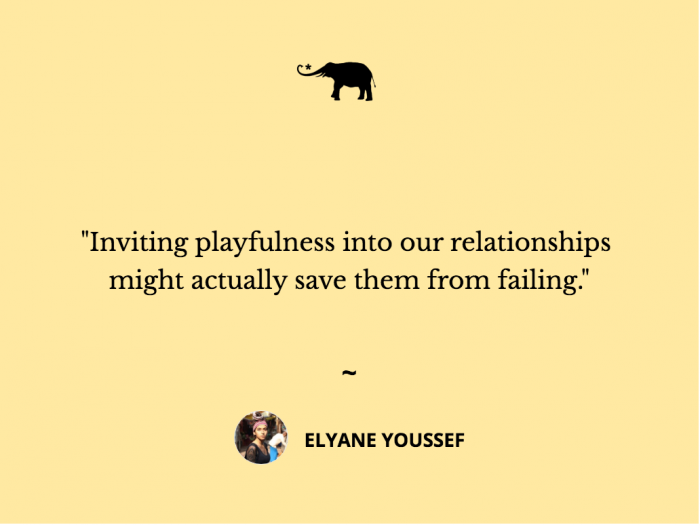View this post on Instagram
Let’s admit it.
We’re all dying to know how to maintain long-term relationships.
Needless to say, the first few months of dating are always fun, exotic, and light. Fights are “cute” and date nights are a must. Laughter is to be expected and cuddling is an inevitability.
Fast forward a few years and it might get harder and harder to hold on to desire, passion, and romance—let alone feel them. And it’s normal. Although we believe that our excitement and glee will last forever, unfortunately, our emotions often fade in long-term unions.
Not because we are bad humans; it’s simply because we are humans. Dating is fun and light because it’s new and most likely devoid of responsibility. The only responsibility we might have is texting or showing up on time on the first date.
Long-term relationships on the other hand encompass lots of duties and obligations—including having children and sharing a place. Consequently, maintaining desire in our union becomes harder and harder as we try to juggle many different things all at once.
That said, we all know and affirm that relationships take work. We can’t just let them operate on autopilot or else they will fail. So yes, we might lose the spark or desire after a couple of months (and it’s okay), but real work begins when we choose to revitalize, prolong, or conserve it.
How can we do that? How can we protect what might be doomed and transform it into a space of trust, originality, and security?
As you may (or may not) know, I recently finished The State of Affairs by relationship therapist Esther Perel. Although I don’t usually come back to the same book twice, that book didn’t go back on the shelf. I’ve kept it on my nightstand; every now and then I open it and reread the content I previously underlined.
However, I find myself constantly coming back to the last chapter where Perel reveals the secrets to desire and romance in long-term relationships.
Let’s dive into them:
1. Openness. Perel beautifully observes that although we all long for stability and reliability, it may never happen. We get stuck in the false belief that our partners may never cheat on us or leave us. Again, it’s wrong. Perel suggests an alternative: to keep an open mind.
“Couples who feel free to talk honestly about their desires, even when they are not directed at each other, paradoxically become closer.”
She clarifies that we don’t necessarily need to have an “open relationship,” rather an open heart, communication, and mind. We become closer when we talk about our vulnerabilities and have risky conversations.
“When we validate each other’s freedom within the relationship, we may be less inclined to go looking for it elsewhere.”
When we become open to our partners’ desires and secrets, no matter how hard or scary it can be, our relationships flourish and we become more intimate.
“When we acknowledge the existence of the third, we affirm the erotic separateness of our partner. We admit that as much as we may want it to, their sexuality does not resolve solely round us. They may choose to share it with us, but its roots are far-reaching. We are the recipients, not the sole sources, of their unfurling desires.”
How beautiful and true this line is: We are the recipients, not the sole sources, of their unfurling desires. When we adopt this thinking, when we believe and know in our hearts that we are not the only source of our partner’s desires, we become more comfortable.
2. Trust. We all know that in order to fully trust our partner, we need to know their whereabouts. They need to prove to us that they are reliable and would never break the trust we put in them. Perel suggests that we may be conflating trust with safety. We might be asking for a proof or promise or vow just to ensure we won’t get hurt.
“We want a guarantee that our partner has our back and would never be so selfish as to put their needs ahead of our feelings. We demand certainty, or at least the illusion of it, before we are willing to make ourselves vulnerable to another.”
As suggested, to trust doesn’t mean to feel safe. On the contrary, to trust means to cope (or gamble) with uncertainty. It’s a leap of faith.
“Trust is an active engagement with the unpredictable.”
As Perel says, when we trust our partner, we are engaging with the unpredictable, the unknown, the scary. We are putting our faith in a moment or event that hasn’t transpired yet. It’s hard; it’s daunting. But I must say it’s less stressful and ensures a happier relationship.
3. Playfulness. As I previously stated, dating is almost always fun and light. Because it’s new; it’s surprising; it’s unpredictable; it’s challenging. The longer couples stay together, the more the essence of dating is lost. We become too familiar with each other and forget what brought us together.
Perel explains that couples who stray may be seeking the part of themselves they have lost along the way. They are seeking the playfulness, the forbidden, the new.
“We also learn from affairs that for most, the forbidden will always hold an allure.”
She says that in order to retrieve the lost desire, we must step out of our comfort zone and break the rules with our partner. When we incorporate the fundamentals of dating into our long-term relationships, we are less likely to cheat and more inclined to stay and actually be happy.
“The current of aliveness, once awoken, is a force hard to resist.”
Last but not least, inviting playfulness into our relationships might actually save them from failing.
“Shared dreams, affection, passion, and endless curiosity—all these are natural ingredients found in the adulterous plot. They are also the ingredients of thriving relationships.”
~












Read 5 comments and reply